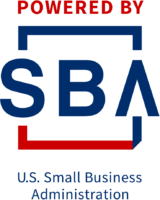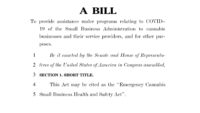All major industries took a hit during the COVID-19 pandemic, but in many states, cannabis dispensaries were labeled as essential, which has allowed the industry to continue with some alterations. The impact now will come from what innovations and improvements the industry can leverage going forward.
From changes to protocols and buyer behaviors to supply chain disruptions, there were many new hurdles for the industry in addition to the ones cannabis businesses already faced, such as funding. But the silver lining could be that businesses within the cannabis industry become less of a specialty and more ‘every day’ than ever before.
The effects of the pandemic on the cannabis industry
Overall, the industry has fared well, in part thanks to its distinction as an essential service in states where cannabis is legal. It’s possible states made this decision for the same reason that alcohol businesses were deemed essential in most places: hospitals are not equipped during pandemic times to take care of people who are being forced to detox or those suffering from anxiety because they don’t have access to their legal drug of choice.
In a multitude of ways, cannabis businesses have adapted to bring calm in a storm while at the same time making manufacturing adjustments to meet the CDC guidelines. For example, there is more attention placed on individually pre-packaged products for single use; something that is less sharable as an experience but eminently practical.
 Another area that has shifted a little is in the limiting of the exchange and interaction between business owners and staff relative to the customers. It’s all in the aim of mitigating the risk of exposure, but it has changed the dynamic in many cannabis businesses. This is the new normal for the time being and the industry has adapted well.
Another area that has shifted a little is in the limiting of the exchange and interaction between business owners and staff relative to the customers. It’s all in the aim of mitigating the risk of exposure, but it has changed the dynamic in many cannabis businesses. This is the new normal for the time being and the industry has adapted well.
Ultimately, retail cannabis businesses today are no different than the retail of candy, cigarettes or alcohol. Certainly, segments of the industry have still struggled. Lack of tourism and the curbside/take out circumstances at dispensaries took their toll. But without the opportunity to still conduct business in some capacity, 50-60% of all operators would have gone out of business. Plus, as many people use cannabis to offset medical symptoms, including pain management, there is a legitimate need for cannabis to be available. The pandemic has provided the opportunity for many who might not have tried it before to give it a chance to help them medicinally.
Behaviors have changed, including those of buyers
Driven by consumer interests, many dispensaries have adapted to provide curbside pickup options, delivery of online orders and more. That has meant that the customer also needs to be more knowledgeable about cannabis: the experienced consumer knows what they like and want and can make their choices at a distance. Someone who is new to cannabis use might find navigating the choices and options a little more difficult, without the help of experienced staff. The breadth of material online and the ability of some dispensaries to share content that helps the consumer to make choices, in the absence of walking around the dispensary, have been additional tools at the disposal of businesses.
 That said, the cannabis industry today is not a vastly different one: it is adapting to the new rules and new reality. Whether this way of doing business—at a distance—is a temporary or permanent solution will be dependent upon what federal and state regulators dictate in the months ahead, but there is likely to be ongoing demand for being able to order online and keep social distance protocols in place.
That said, the cannabis industry today is not a vastly different one: it is adapting to the new rules and new reality. Whether this way of doing business—at a distance—is a temporary or permanent solution will be dependent upon what federal and state regulators dictate in the months ahead, but there is likely to be ongoing demand for being able to order online and keep social distance protocols in place.
An interesting example is the Ontario Cannabis Store (OCS) in Ontario, Canada. This is a government run shop that has retail as well as a robust online presence, with free delivery during the pandemic. This has facilitated an increase in new customers, which had already jumped, post legalization. People who might have felt uncomfortable going into a dispensary can still learn about cannabis online and order it, from the relative comfort and safety of their sofa.
Supply chain disruptions and the cannabis industry
The industry has long been focused on overseas suppliers. With the arrival of the pandemic and restrictions on obtaining products from other countries, supply chains have been disrupted for many cannabis businesses. That has forced many to shift their supply chains to more local manufacturers, in North and South America.
In the long run, this should have a positive impact for the industry, so that despite the short-term disruption to the supply chain, which is having an impact on the industry as a whole, there could be an upside for local producers, growers and manufacturers. It will take time to know how this will all play out.
Funding and other issues for the cannabis industry
For a new cannabis startup in these times, the key will be what it has always been for any business, just to a greater degree: due diligence. Companies that want to open a cannabis business, whether during the pandemic or not, need to evaluate the opportunity as one would any investment. It’s all about the numbers: data for the industry as a whole and specifically from competition. These days, that data is widely available and more and more consultants and investors have expertise in this industry. “Overall, there is more interest in the industry than ever before”
It’s vital to be extremely well versed, particularly for businesses that are relatively new in the industry, because the single biggest issue for many has and will continue to be funding and investment. The cannabis industry is no different than any other business, except for the fact that it is a specialty business. With that comes the need to look for funding among investors who have some knowledge or appreciation for the industry.
Some of the key concerns traditional investors will have include:
- Regulatory differences from state to state: since cannabis is still illegal at the federal level, there can be an array of hurdles at state and local level that make cannabis businesses trickier to work with.
- There are religious based/morality issues for some lenders in dealing with the industry. These aren’t dissimilar from issues with other industries such as adult entertainment and gaming. It’s also fair to point out that, morality aside, these industries have thrived in the last several decades.
So, while traditional banking institutions will often deal with the proceeds from the cannabis industry, including allowing bank accounts for these businesses, there is far less of a chance that they would invest in a cannabis business, for fear of risking their license. They can even go so far as to refuse to include income from a cannabis business in the determination of a loan application.
There are more unique lending or investing groups that either specialize in cannabis or are starting to open their books to specialize in cannabis. Overall, there is more interest in the industry than ever before, as it becomes normalized in American society: more participants and more insiders of the industries that are willing to invest in the right idea.
Will legalization be more likely in the future?
The fact that cannabis businesses and dispensaries have been deemed essential services during the pandemic, where they legally operate, has shed new light on the relevance of these businesses and the advantages of more widespread legalization.“Consumers will help drive the innovations as they demand clean consumption methods”
In fact, the pandemic has normalized a lot of new behaviors, including the acceptable use of cannabis to help with stress and anxiety. People are, perhaps thanks to staying at home more, doing the legwork to understand how cannabis could be useful to them in managing their stress. The medicinal benefits of cannabis have long been researched and understood: consumers are coming into the fray to express their interest in it, which can only fuel the possibility of more widespread legalization.
Add to this the fact that the cannabis industry is a growth industry. There are companies and jobs that aren’t coming back, post-pandemic. There is an opportunity to grow the cannabis industry to the general benefit of many, both as business owners and employees. The revenue generated from taxation following legalization would also benefit many state coffers. Federal level legalization would be the panacea to eliminate the mixed message, state by state regulation that currently exists.
Opportunities for innovation, moving forward
As more and more people become interested in the industry, and as cannabis use is normalized within society through legalization, the opportunities for the industry can only expand.
For an industry that started on the simple concept of smoking cannabis, the advances have already been legion: edibles, nanotechnology-based formulations for effective, clean consumption and many more innovations.
In a world that increasingly sees smoking as a negative, for the obvious impact to lung health, there are so many opportunities to grow the industry to find consumption methods that are safe and still deliver the impact of the inhaled version.
Here again, consumers will help drive the innovations as they demand clean consumption methods. The technology is available to make this possible; it only takes innovation and education to find the best ways to move this industry forward.
As legalization expands—and particularly if it is dealt with at the federal level—the industry will be able to capitalize on existing infrastructure for manufacturing and distribution, allowing new businesses to grow, get funded and thrive in the new normal.


















